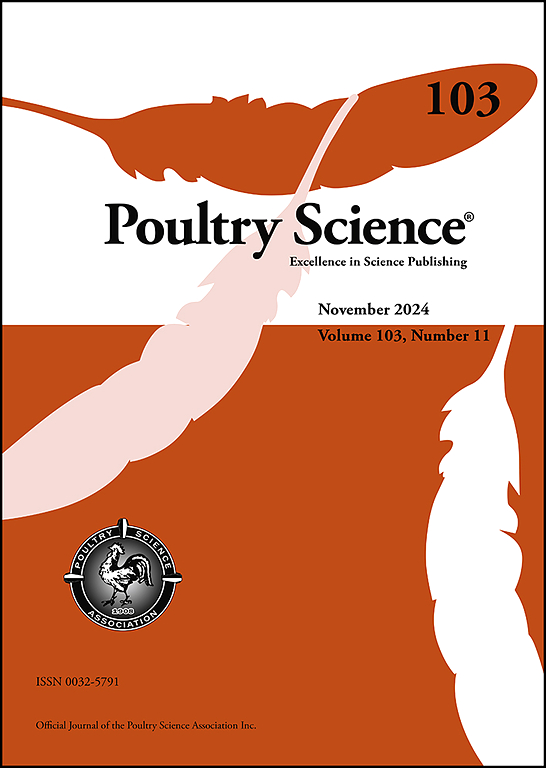变绿期鸡冠发酵白化茶对雏鸡脂肪沉积的改善作用
IF 3.8
1区 农林科学
Q1 AGRICULTURE, DAIRY & ANIMAL SCIENCE
引用次数: 0
摘要
雏鸡在生长过程中逐渐过渡到以脂肪积累为主的发育阶段。预防和解决这一问题仍然是家禽研究领域的一个重点。本试验旨在研究发绿期鸡冠发酵白化茶对雏鸡脂肪沉积的影响。试验选用8周龄的丽阳鸡120只,随机分为6组(n=20):对照组(基础饲粮)、黑茶组(基础饲粮中添加1%黑茶)、绿茶组(基础饲粮中添加1%绿茶)和I、II、III组(基础饲粮中分别添加1%、2%和4% EFAT)。饲喂期16周。结果表明,通过观察生长数据和计算饲料系数(FCR),饲粮中添加EFAT可提高饲料资源利用效率,降低生产成本。通过观察屠宰指标和肝脏状况,检测肉成分,显著降低腹部脂肪和肌内脂肪。补充EFAT可显著缓解血浆甘油三酯(TG)、总胆固醇(TC)、低密度脂蛋白胆固醇(LDL-C)、高密度脂蛋白胆固醇(HDL-C)、丙氨酸转氨酶(ALT)、天冬氨酸转氨酶(AST)、谷氨酸转氨酶(GGT)等生化指标的变化。此外,通过测定抗氧化活性,添加EFAT显著降低丙二醛(MDA)含量,提高总超氧化物歧化酶(T-SOD)、过氧化氢酶(CAT)和谷胱甘肽过氧化物酶(GSH-Px)活性。综上所述,添加EFAT可通过调节生长和屠宰指标、改善肝脏状况、血液生化指标甚至抗氧化性能来减轻脂肪沉积、腹部脂肪和肌内脂肪。这为研究白化茶对高脂鸡的作用提供了科学依据,对家禽业的发展具有重要意义。本文章由计算机程序翻译,如有差异,请以英文原文为准。
Ameliorative effects of E. cristatum fermented albino tea at the regreening stage on fat deposition of youth chicken
Youth chickens will gradually transition to a fat accumulation-based development stage in their growth. The prevention and resolution of the issue is still a focus in the field of poultry research. The aim of this study was to investigate the effects of E. cristatum fermented albino tea at the regreening stage (EFAT) on the fat deposition of youth chicken. In this study, a total of 120 Liyang chickens (age, 8 week) were randomly allocated into 6 groups (n=20): control group (basal diet), Dark tea group (basal diet supplemented with 1% dark tea), Green tea group (basal diet supplemented with 1% green tea) and I, II, III group (basal diet supplemented with 1 %, 2 % and 4 % EFAT, respectively). The feeding trial lasted 16 weeks. The results showed that EFAT supplementation improved the efficiency of feed resource utilization and reduced production costs by observing the growth data and calculating feed conversion ratio (FCR). It significantly reduced abdominal fat and intramuscular fat by observing the slaughter indicators and liver condition, and testing meat composition. EFAT supplementation significantly alleviated changes of biochemical parameters, including plasma triglycerides (TG), total cholesterol (TC), low-density lipoprotein cholesterol (LDL-C), high-density lipoprotein cholesterol (HDL-C), alanine Transaminase (ALT), aspartate aminotransferase (AST), and glutamate aminotransferase (GGT). Moreover, EFAT supplementation markedly decreased content of malondialdehyde (MDA), and increased activities of total superoxide dismutase (T-SOD), catalase (CAT) and glutathione peroxidase (GSH-Px) by determining antioxidant activities. In conclusion, EFAT supplementation alleviated fat deposition, both abdominal fat and intramuscular fat by regulating growth and slaughter indicators, improving liver condition, blood biochemical profile and even antioxidant properties. This provides a scientific basis for the study of albino tea on high-fat chicken, which is of great significance to the development of the poultry industry.
求助全文
通过发布文献求助,成功后即可免费获取论文全文。
去求助
来源期刊

Poultry Science
农林科学-奶制品与动物科学
CiteScore
7.60
自引率
15.90%
发文量
0
审稿时长
94 days
期刊介绍:
First self-published in 1921, Poultry Science is an internationally renowned monthly journal, known as the authoritative source for a broad range of poultry information and high-caliber research. The journal plays a pivotal role in the dissemination of preeminent poultry-related knowledge across all disciplines. As of January 2020, Poultry Science will become an Open Access journal with no subscription charges, meaning authors who publish here can make their research immediately, permanently, and freely accessible worldwide while retaining copyright to their work. Papers submitted for publication after October 1, 2019 will be published as Open Access papers.
An international journal, Poultry Science publishes original papers, research notes, symposium papers, and reviews of basic science as applied to poultry. This authoritative source of poultry information is consistently ranked by ISI Impact Factor as one of the top 10 agriculture, dairy and animal science journals to deliver high-caliber research. Currently it is the highest-ranked (by Impact Factor and Eigenfactor) journal dedicated to publishing poultry research. Subject areas include breeding, genetics, education, production, management, environment, health, behavior, welfare, immunology, molecular biology, metabolism, nutrition, physiology, reproduction, processing, and products.
 求助内容:
求助内容: 应助结果提醒方式:
应助结果提醒方式:


